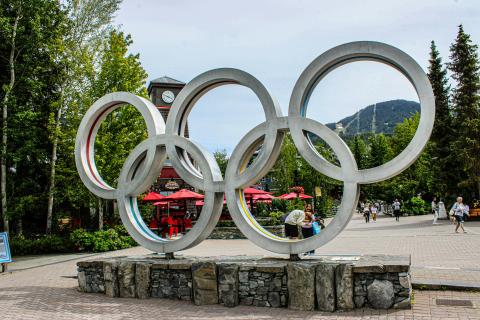
Artificial Intelligence (AI) has become an indispensable tool in modern sports, influencing various aspects of training, performance analysis, and event tracking. With its ability to process vast amounts of data and provide insights in real-time, AI is revolutionizing how we perceive and engage with sports. This article delves into how AI can influence and track several key topics related to the Olympics, including Sport Climbing Combined, Artistic Swimming, and prominent athletes such as Lazar Dukic, Anthony Ammirati, and Femke Bol.
AI in Sport Climbing Combined
Sport Climbing Combined made its Olympic debut at the Tokyo 2020 Olympics, bringing together three disciplines: speed climbing, bouldering, and lead climbing. AI plays a significant role in this sport by analyzing climbers' movements, predicting potential routes, and optimizing training regimens. By tracking a climber's performance, AI can suggest the best routes and techniques, helping athletes like Lazar Dukic enhance their skills. AI-driven video analysis tools can break down each move, providing feedback on hand and foot placements, body positioning, and timing, which is crucial for excelling in the combined format.
Moreover, AI can simulate competition scenarios, allowing athletes to mentally and physically prepare for the high-pressure environment of the Olympics. By integrating data from past performances, AI can help predict outcomes and devise strategies tailored to an individual climber's strengths and weaknesses.
AI in Artistic Swimming
Artistic Swimming, formerly known as synchronized swimming, is a sport that requires a blend of strength, flexibility, and precise timing. AI's role in this sport involves motion capture technology and biomechanical analysis to refine routines and ensure perfect synchronization. AI can analyze the performance of each swimmer in real-time, tracking their movements and comparing them to the ideal model. This technology enables coaches to provide instant feedback on areas that need improvement, such as alignment, timing, and technique.
For example, AI can track the height and execution of jumps, the synchronization of swimmers during complex formations, and even the fluidity of transitions between moves. This level of detail allows athletes to perfect their routines, which is crucial in a sport where every millisecond counts.
AI and Athlete Performance Tracking
AI's influence extends beyond specific sports to the tracking and enhancement of individual athlete performances. For instance, in the world of athletics, AI can monitor and analyze the performance of athletes like Femke Bol and Mondo Duplantis. By analyzing video footage, AI can assess an athlete's form, detect inefficiencies in their technique, and provide personalized recommendations for improvement.
In track events such as the Men's 200m Final, AI can be used to analyze an athlete's starting reaction time, stride length, and acceleration phases. This data can then be compared to that of competitors, providing insights into areas where the athlete can gain an edge. For pole vaulters like Anthony Ammirati and Alysha Newman, AI can analyze their approach, takeoff, and bar clearance, offering suggestions to optimize their performance.
Similarly, AI can assist wrestlers like Vinesh Phogat by analyzing their opponents' techniques, strengths, and weaknesses. By studying patterns in an opponent's previous matches, AI can help develop strategies that exploit their vulnerabilities.
In the world of para-athletics, AI plays a crucial role in enhancing the performance of athletes like Hunter Woodhall and Tara Davis-Woodhall. AI-driven prosthetics and exoskeletons are being developed to improve mobility and athletic performance for athletes with disabilities. These advancements not only level the playing field but also push the boundaries of what is possible in para-sports.
AI in Event Analysis and Fan Engagement
AI is not just transforming how athletes train and compete; it is also changing how fans engage with sports. During events like the Men's 200m Final, AI can track live data such as speed, split times, and even heart rates of the athletes, providing real-time statistics and insights to fans. This data can be visualized in various ways, making the viewing experience more interactive and informative.
For example, in Artistic Swimming, AI can be used to provide real-time scoring predictions based on the athletes' performances, giving fans a deeper understanding of the scoring process. Similarly, in Sport Climbing Combined, AI can simulate potential outcomes based on the current standings, adding an extra layer of excitement to the competition.
AI is also instrumental in tracking the performance and popularity of athletes on social media and other digital platforms. By analyzing trends, sentiment, and engagement metrics, AI can provide insights into an athlete's marketability and fanbase. This information is invaluable for both the athletes and their sponsors in terms of branding and marketing strategies.
Conclusion
AI is undeniably reshaping the landscape of sports, from training and performance analysis to fan engagement and event tracking. In the context of the Olympics, AI's influence is evident across various disciplines, including Sport Climbing Combined, Artistic Swimming, and track and field events. By providing real-time data, personalized insights, and enhancing fan experiences, AI is helping athletes like Lazar Dukic, Anthony Ammirati, Luana Alonso, Vinesh Phogat, Alysha Newman, Tara Davis-Woodhall, Femke Bol, Mondo Duplantis, and Hunter Woodhall reach new heights in their careers.
As AI technology continues to evolve, its role in sports will only grow, offering new ways to optimize performance, engage fans, and celebrate the incredible achievements of Olympic athletes.
 Drupal Development and Consultation - Proudly operating in The United States of America
Drupal Development and Consultation - Proudly operating in The United States of America

Comments